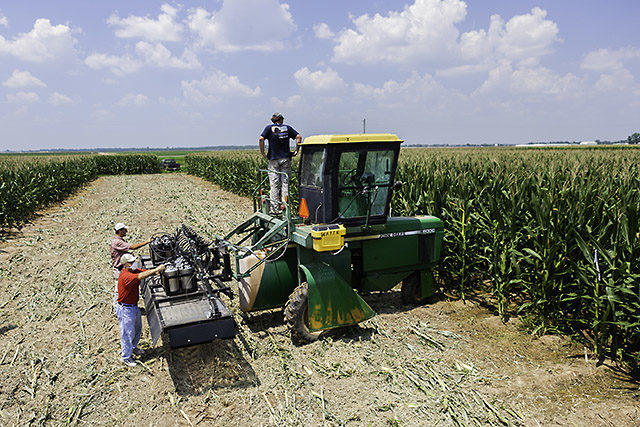Pictured Above: In Stoneville, Mississippi, plant pathologist Hamed Abbas (red shirt) and his field crew prepare to spray corn with a new aflatoxin-control formulation. (Stephen Ausmus, D1899-1)
By Sandra Avant, Office of Communications
A new sprayable bioplastic — made of cornstarch and other natural ingredients — offers potential as an effective method for delivering beneficial microbes to fight aflatoxins and other agricultural pathogens and pests.
Aflatoxins are highly toxic substances produced by many species of Aspergillus fungi. Aflatoxins can contaminate corn, peanuts, cotton, and other crops, and at high doses they threaten the health of people, pets, fish, livestock, and other animals. They have been known to cause acute and chronic liver injury and liver cancer.
But not all Aspergillus fungi produce aflatoxins; some strains are considered beneficial. Agricultural Research Service (ARS) scientists are using helpful Aspergillus species to prevent harmful ones from contaminating crops like corn.
Aflatoxin is a chronic problem in the southern United States, says plant pathologist Hamed Abbas, with ARS’s Biological Control of Pests Research Unit in Stoneville, Mississippi. Estimates of economic losses due to aflatoxin contamination vary. In the United States, annual loss estimates range up to more than $200 million for corn and $500 million for corn, peanuts, and other crops combined.
U.S. Food and Drug Administration regulations prohibit the sale of corn or any other grain that contains more than 20 parts per billion of aflatoxin. Grain that exceeds this level cannot be used for human or animal consumption.
In earlier research, published in Crop Protection in 2011, Abbas, other ARS scientists, and collaborator Cesare Accinelli with the University of Bologna, Italy, encapsulated a nontoxic, beneficial strain of Aspergillus in granules of bioplastic — a biodegradable plastic derived from organic substances rather than petroleum. The granules worked well in reducing aflatoxins when spread onto soil in the furrows between waist-high corn plants. However, growers needed a more efficient and effective method of delivering the beneficial Aspergillus.
Recently, Abbas and Accinelli developed a sprayable biodegradable formulation that makes it easier to apply beneficial agents to soil, plants, and seeds. In studies, published in Pest Management Science in 2016 and the Journal of Agricultural and Food Chemistry in 2017, aflatoxin contamination of corn was reduced by 97 percent using this system.
“With the sprayable method, we don’t have to put the beneficial fungus or spore on a granule of bioplastic,” Abbas says. “We melt the bioplastic into a liquid, mix in the biological control agent — a nontoxic, beneficial Aspergillus in this case — and then spray it on the plants or coat the seeds with it.”
Other formulations and approaches are helpful in controlling aflatoxins, but there is no silver bullet for commercial use, Abbas says. Biological control is the most effective so far.
“The beauty of the bioplastic is that it’s made of cornstarch, which is sticky,” he adds. “There’s no need to add other materials to make it stick to the plant or seed. Secondly, it provides nutrition for the beneficial microbes, because cornstarch is rich in carbon and energy. Thirdly, bioplastic can deliver the biological control agent to protect the plant from bad pathogens.”
Another advantage of the bioplastic is that it can be delivered in one application in any form — granule, liquid, spray, or seed coating, Abbas adds. It is inexpensive, has a long shelf life, and is easy to apply.
This technology has other potential commercial applications, Abbas notes. In experiments, other microbial biocontrol agents have significantly reduced damage caused by the European corn borer in corn and the tarnished plant bug in cotton. In addition, this technology has the potential to protect seeds from soilborne pathogens, thereby reducing damping-off disease in tomato plants.
ARS has received a patent on its bioplastic technology, which has been licensed by a commercial company.






